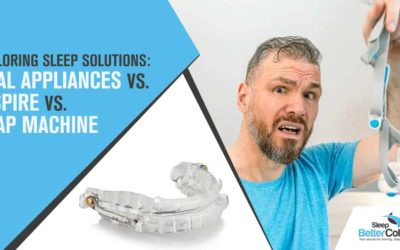Sleep apnea is a chronic sleeping disorder where breathing is consistently interrupted. This occurs due to human anatomy problems or because of central nervous system disconnections involving your respiratory system. But how do you know if you have sleep apnea?
This is what this article is going to uncover. There are millions of people living in the U.S that have sleep apnea and you can be one of them. Learning how to pinpoint what symptoms you may be suffering from will give you the awareness to get the help you may so desperately need to prevent further medical deterioration.
Let’s start with what many fall victim too and that is the symptoms.
The Symptoms of Sleep Apnea and How They Are Ignored
We are all busy, and we also tend to make things no big deal. Well, sleep apnea is a very big deal. To be fair, most people have no idea what sleep apnea is. And if you don’t know what it is then how do you know you have it?
The dilemma that plagues over 22 million Americans living with OSA (Obstructive sleep apnea). This can be scary to think about right? Another interesting fact is out of this large group of people around 80% are undiagnosed. Meaning with the knowledge and awareness of this chronic disorder is going to drastically improve your quality of life once properly treated if, in fact, you do have OSA.
Before we list the most common symptoms you need to know that if you have sleep apnea it can be any of the three types. Earlier we discussed obstructive sleep apnea. This is the most common. There is the second type of central sleep apnea (CSA) this affects your sleep health severely.
Central sleep apnea means your nervous system and respiratory system fail to communicate when you are asleep. Or communicates poorly, is the sense you breath shallow, or hold your breath ever second or third breath.
The last type is complex sleep apnea that mixes both OSA and CSA. This is the most severe because your upper airway and nervous system are compromised. Consequently causing your health to plummet in more than one way.
Symptoms
Hypersomnia – Excessive daytime drowsiness, if you constantly find yourself tired or always yawning it means your brain is not receiving enough oxygen because of shallow breathing. Which extends to when you sleep.
Headaches first thing in the morning – You should wake up refreshed and ready for the day with energy. If you have a morning headache it means you did not sleep well. Happening consistently is a clear sign of sleep apnea.
Insomnia – When you have difficulty staying asleep you have a sleeping disorder. Not getting a healthy amount of sleep causes stress on the heart, and brain to perform without energy and the proper recovery time you need daily. If you can’t sleep you need to be tested for sleep apnea.
Snoring Loudly – If you snore, this means there is blockage of your airway because of a change in your anatomy of the airway. This is a very common symptom for OSA.
Waking up feeling confused – Waking up confused in the middle of the night is also a symptom of OSA. You also have a tendency to wake up gasping for air because of holding your breath while sleeping.
Not Breathing During Sleep – This is observed by someone else as you sleep. They may notice your chest is not rising consistently.
Difficulty focusing while awake – Being able to focus clearly on a task is necessary for safety if you working with machinery, or if your driving. If you have trouble focusing you need to consult your physician.
How You are Diagnosed With Sleep Apnea
So we talked about the most common symptoms of sleep apnea. What next? If you feel you have any of these symptoms what should you do? If you want to get the help you first need to set up an appointment with your primary care physician. Go see them, tell them about your concerns about not sleeping, and most likely you will receive a referral to a sleep doctor.
These are doctors that specialize in sleep medicine and sleeping disorders. Depending on your medical insurance you may not need a referral, but it’s always good to get a full check-up to make sure there are no other underlying issues.
Once you are in front of a sleep study doctor they will ask you a series of questions. Once the criteria are met for a sleep study, you will be given an appointment. And specific instructions on when to arrive for your sleep study.
The sleep study is a test that monitors your chest wall moment as you sleep, along with how much air is released from your nose and mouth during slumber. Your brain waves are also measured to check for neurological disconnect while sleeping. Consider doing research on sleep studies before you arrive for your appointment so you are not overly nervous.
Sleep study technician make you feel comfortable and explain everything during the setup. You will have electrodes attached to your head, arms, chest, and legs. Which helps to monitor heart rate as well.
The Results
When your sleep study is completed you will set an appointment for about 1-2 weeks away. This will give your sleep doctor the time to evaluate your sleep test, checking for symptoms of hypopneas (holding your breath) and shallow breathing. Also, your sleep doctor will study your brain waves and heart rate throughout the night.
Once your test has been completely reviewed, you will get your results and at that time find out if you have sleep apnea. Moreover, you will learn the type, whether it’s obstructive, central, or mixed. The doctor will also inform you if it’s mild, moderate, or severe in nature.
Sleep apnea poses several health risks and the consequences of not treating it can be severe. Hypertension, heart failure, and cardiovascular disease are just a few chronic conditions that can be provoked because of sleep apnea.
In Conclusion
As you learned above, if you have sleep apnea it’s very important to be properly treated. This avoids further stress and problems with your health that OSA can cause. Dr. Levy and the staff of Sleep Better Columbus will guide you every step of the way.
OSA is extremely easy to treat. There is no need to be afraid. What you don’t want is to let this chronic condition linger.
And with state of the art equipment and Oral Appliances; you have access to the experience Better Sleep Columbus provides their patients. This eliminates promoting further deterioration of your health and gives you several options to remain comfortable during your sleep apnea treatment.




